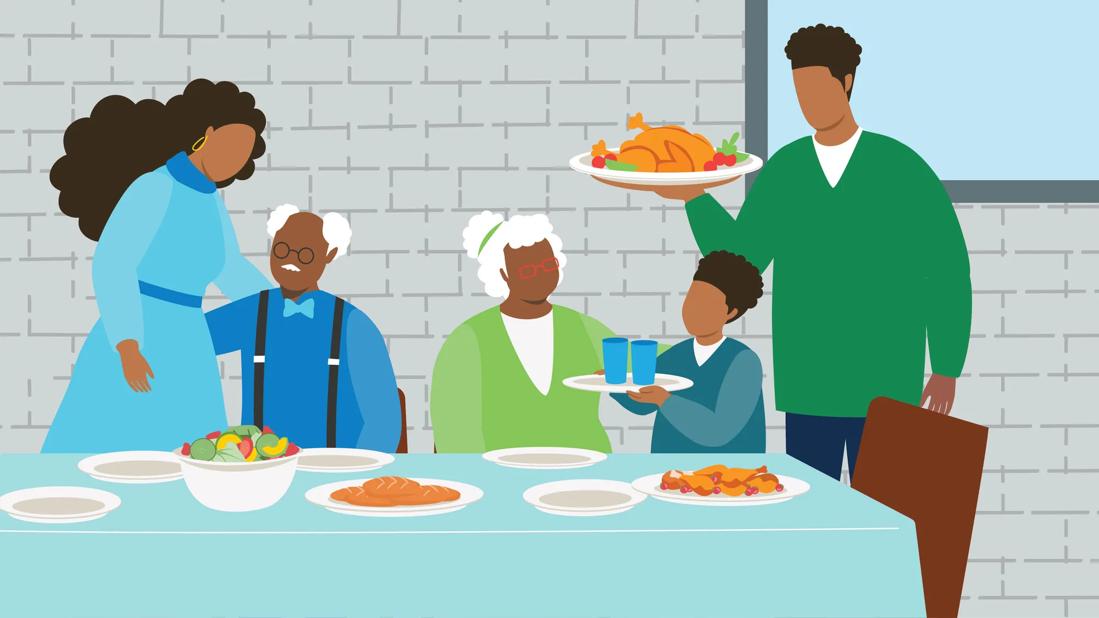Follow these tips, like hand washing and self-care, to keep illness at bay as you celebrate the season

Image content: This image is available to view online.
View image online (https://assets.clevelandclinic.org/transform/d0bad4cf-e88d-4787-a1d1-557cde630c03/family-eating-holiday-2244108767)
People gathered around holiday table getting ready to eat
The holidays are a season of giving — and unfortunately, that often includes illness.
Advertisement
Cleveland Clinic is a non-profit academic medical center. Advertising on our site helps support our mission. We do not endorse non-Cleveland Clinic products or services. Policy
So, how can you avoid getting sick, or spreading sickness while celebrating the season with family and friends? We asked family medicine physician Neha Vyas, MD, to put together a plan to keep everyone safe.
Germs aren’t exactly in short supply. In fact, they’re on just about EVERYTHING in the world around us — and you’re picking them up with your hands far more than you might think.
Washing your hands regularly during the holidays can minimize your chances of getting sick from a random bit of ickiness you touched. Alcohol-based hand sanitizer can work in a pinch, too.
A simple 20-second scrub with soap and water or a squeeze of sanitizer can limit your risk of catching a respiratory illness like:
“We’re typically out and about more and meeting up with people during the holidays,” notes Dr. Vyas. “All of that increases your exposure to germs. Washing your hands often is one way to guard against them.”
Let’s be honest here: The hustle and bustle of the holidays can run you ragged. A calendar filled with get-togethers, events and travel can gradually wear you down and weaken your immune system.
“It’s important to take care of yourself during the holidays,” emphasizes Dr. Vyas. “Don’t ignore what your body needs to fight off infections.”
Advertisement
That includes:
Holiday parties often come with food, but what you eat might not leave you feeling jolly.
Stomach-churning cases of foodborne illness tend to spike over the holidays as hosts scramble to fill buffet tables. That cooking frenzy in the kitchen can lead to undercooked meats or cross-contaminated food.
Yummy dishes that sit out for too long during parties can also become a concern, cautions Dr. Vyas. Bacteria grow rapidly on food left at room temperature.
Dr. Vyas serves up these food safety suggestions to ensure the talk after your party isn’t on who got food poisoning:
Advertisement
Nobody wants to miss a holiday bash, right? Well, sometimes it’s the right choice.
“Listen to your body,” recommends Dr. Vyas. “If you’re experiencing any symptoms from a virus, it’s best to stay home. A night in can help you recover and prevent you from spreading your illness to others.”
Send regrets for an event if you’re experiencing:
If you’ve been sick, be mindful of how long you may still be contagious, too. You may still spread the flu virus five to seven days after symptoms start, for instance. You can share your cold for up to two weeks!
“Be honest with yourself,” says Dr. Vyas. “If you’re not feeling great, stay home.”
You never want to be sick or risk passing illness to others, but that’s especially true during the holidays. The festive time of year should be about connection, celebration and making memories — not sniffling and sneezing.
So, work to keep illnesses off your guest list with a little planning and self-care. With any luck, you’ll have a happy and healthy holiday season!
Advertisement

Sign up for our Health Essentials emails for expert guidance on nutrition, fitness, sleep, skin care and more.
Learn more about our editorial process.
Advertisement
Wash your bath towels at least once a week, and washcloths at least twice a week
This puffy shower accessory can become lodged with skin cells (and other gross things), so make sure you dry it daily and clean it once a week
Some dryers spread germs instead of removing them
Infants are at high risk of severe RSV, but getting the vaccine during pregnancy helps protect them from it
Chilblain-like skin lesions and rashes are mild (and rare) complications of many viral infections, not just COVID-19
They can feel similar, but the differences matter — especially if you’re at higher risk for complications
It’s a great disinfectant for around your home, but not for your skin
Doctors say that vaccination is an effective way to guard against influenza — and that it cannot give you the virus
Although it could be used as a moisturizer, this new trend is not recommended
Communicating clear limits helps protect your time, energy and emotional well-being
High cholesterol can be genetic, but testing and treatment can lower your heart disease risk